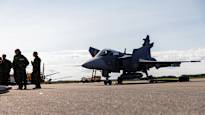Support for Ukraine will be discussed at the NATO defense ministers’ meeting on Thursday. Finland hopes that staff affairs will progress.
Maria Stenroos,
Hannele Muilu
13:08•Updated 13:31
For the time being, Sweden will have to wait in its plans to hand over Gripen fighters to Ukraine.
In the spring, Sweden promised Ukraine fighter jets and a radar surveillance plane. Since the beginning of the war, Ukraine has hoped to get fighter jets from the West to cope with the Russian attack. So far, only a few MiG fighters have been delivered to the country.
Now the problem has become that the West offers too many fighter types. The most advanced is the training of F-16 fighter pilots and the delivery of the machines to Ukraine. F-16 fighters are expected from more countries and more than Swedish fighters, and the project is further along, so the Swedes are waiting.
Sweden’s promised radar surveillance plane can also work with F-16 fighters, and its donation can happen faster than the possible handover of Gripens.
The use of airplanes in Ukraine also requires personnel training and, in addition, a maintenance system must be built, for example.
Prime Minister of Sweden Ulf Kristersson and the President of Ukraine Volodymyr Zelenskyi signed an agreement on fighter cooperation at the end of May.
– We continue the discussion about Gripens. The agreement says it is important that this is done in close coordination with the other 15 countries involved in the fighter coalition, taking into account the use of multiple fighter systems, Sweden’s defense minister Pål Jonsson said on the occasion of the NATO meeting in Brussels.
France also announced a couple of weeks ago that it would hand over Mirage fighters to Ukraine and train pilots.
NATO takes responsibility from the United States in support of Ukraine
Supporting Ukraine in the war dominates the discussions at NATO’s extraordinary meeting of defense ministers.
NATO countries are trying to agree on four-year support for Ukraine. The aid would be 50 billion euros annually, but the details are still open.
Until now, military aid to Ukraine has been led by the US-led Ramstein group. NATO would take over some of the tasks. Handing over weapons would still be the responsibility of the allied countries.
Secretary General of NATO Jens Stoltenberg said last week in Finland that there have been bumps and delays in support, which Ukraine has suffered from and which should not happen again.
Finland promotes the staff issue
The transition of Finland and Sweden under the Norfolk Joint Operations Headquarters in the United States is still being worked on.
Since the United States is far away, regional centers are also needed for the Northern European command. At the beginning of the winter, Finland made its proposal that Finland would have a land force headquarters operating under Norfolk and a FLF headquarters (forward land forces) coordinating the forces of other countries training here. According to Häkkänen, Finland has negotiated the matter with the member countries and the negotiations will now continue in connection with the meeting of defense ministers.
– It is important for Finland to have a strong command structure in the north, Defense Minister Antti Häkkänen highlight.
Yesterday, Stoltenberg met the Prime Minister of Hungary Viktor Orbán in Budapest. During the meeting, it became clear that Hungary does not want to give aid to Ukraine. NATO allows a country to opt out, and this is not unusual in the alliance.
However, Hungary does not prevent support from other member states.
According to Häkkänen, Hungary’s refusal to support Ukraine does not weaken the West’s support.
– Hungary has not given support until now. Only the concrete military, material, financial support given is decisive.
The situation is different from the EU, where a unanimous decision of the member states is required to pay the subsidies, and the subsidies are blocked by Hungary’s opposition. In the EU, Hungary has blocked the implementation of the payment of support even when it has already accepted the support in principle. Hungary opposes, for example, using the proceeds of Russia’s frozen funds to support Ukraine.
The G7 countries will discuss the use of the proceeds of the frozen funds at their meeting in Italy.
